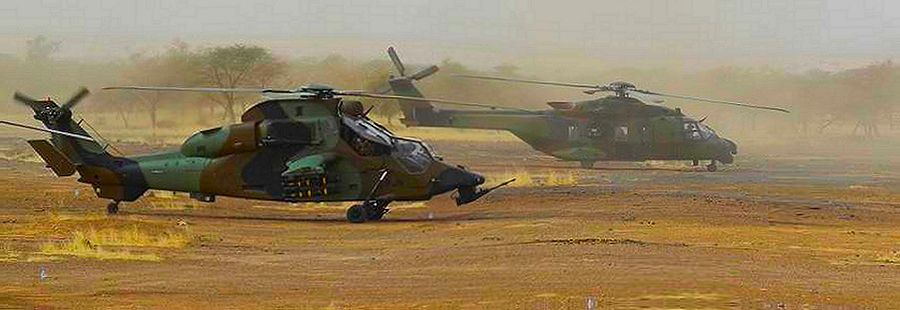DRAMA IN MALI THIRTEEN DEAD SOLDIERS
IN AN ACCIDENT OF TWO HELICOPTERS |
|
Thirteen French soldiers of the Barkhane force were killed in Mali in an accidental collision of two helicopters during a combat operation against jihadists, announced Tuesday the Elysee in a statement. A Tiger Combat Helicopter collided with a Cougar Maneuver and Assault Helicopter, according to the Army Staff, resulting in the deaths of six officers, six NCOs and a Master Corporal who were on board . 
The accident occurred Monday night as part of a Barkhane operation, which mobilizes 4500 soldiers in the Sahel. "Engaged on the ground for a few days, the commandos tracked down a group of terrorists, identified a few hours earlier, who evolved into pickups and motorcycles. Very quickly, they were reinforced by helicopters and a patrol of Mirage 2000, "said the Ministry of the Armed Forces in a statement. "In all likelihood, a collision between these two aircraft operating at very low altitude would be at the origin of the accident," said the staff of the Armed Forces in a statement. This incident is one of the heaviest human balance sheets suffered by the French army since the Drakkar bombing in Beirut in 1983. This accident brings to 38 the number of French soldiers killed in Mali since the beginning of the French intervention in this Sahel country in 2013, with Operation Serval. Emmanuel Macron hailed "with the utmost respect the memory of these soldiers of the army (...) fallen in operation and died for France in the fight against terrorism in the Sahel". Why the operation barkhane ? The French operation, launched in August 2014 after Operation Serval 2013, is being conducted in five countries (Chad, Niger, Mali, Mauritania, Burkina Faso) of the Sahelo-Saharan strip, a vast area like Europe. Its aim is "the appropriation by the five partner countries of the fight against armed terrorist groups", according to the Ministry of Defense Operation Barkhane took over from Serval to stabilize the Sahel, with 4,000 troops deployed in five countries (Mali, Burkina Faso, Mauritania, Niger and Chad). But entire areas are still beyond the control of the Malian, French and UN forces, regularly targeted by deadly attacks. Jihadist groups can blend into a population they know well. Not only do they reign terror by imposing on the inhabitants their ultrar- riist version of the Qur'an, but they also exploit the evils of the country. the poor governance, the weakness of the state against banditry, impunity to spread their propaganda and recruit. As a result, the country is more and more gangrenous in the face of the weakness of the Malian state, which is on the verge of "implosion". So the military intervention must be coupled with a political vision. |
|
| Luc T. for DayNewsWorld | |
 |
|



